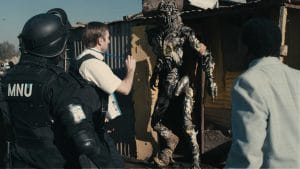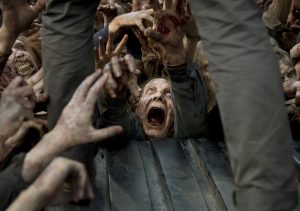I don’t watch TV for reality, man, I watch it for zombies and wizards. Mainstream, network television is digital chloroform. Watching just five minutes of it puts me right to sleep.
In other words, I love me some genre fiction. And genre fiction–whether it be pulpy action, science fiction, fantasy, horror, or superheroes–differentiates itself from mainstream media by its heavy reliance on tropes.
What is a trope, you might ask? Well, see if these ring a bell:
- A lone survivor in a post-apocalyptic landscape.
- A reluctant paladin called to defend his homeland.
- The savior-sacrifice in defense of the galaxy.
- Splitting up to visit a dark, spooky basement.
- A rebellious assault against an overwhelming force.
 Tropes are the reason that many horror, action, and science fiction stories ring vaguely familiar as you watch them. All good stories have already been told, as they say.
Tropes are the reason that many horror, action, and science fiction stories ring vaguely familiar as you watch them. All good stories have already been told, as they say.
But, genre fiction succeeds precisely because many writers manipulate these tropes in a cleverly skillful way! They turn tropes on their head, in other words. Maybe the authors subvert them, or unpack them, and maybe either shamelessly point right at them in a way that is meant to simply maximize the familiar fun.
Consider the following examples. Some of the best works of science fiction lately have been those that rely super heavily on tropes, on what we think we know about a certain genre, and then proceed to show us by clever sleight-of-hand what we may have overlooked.
 Buffy the Vampire Slayer Have we not seen the distressed blonde in a horror story before? But Buffy the Vampire Slayer takes that tired ‘ole trope and turns it into one of the all-time best TV genre shows. Speaking of trope-up horror TV…
Buffy the Vampire Slayer Have we not seen the distressed blonde in a horror story before? But Buffy the Vampire Slayer takes that tired ‘ole trope and turns it into one of the all-time best TV genre shows. Speaking of trope-up horror TV…
The Walking Dead A band of survivors face an overwhelming force of numbers in a post-apocalyptic landscape. That’s as tropey as it gets. But viewers know that the real threat are the humans themselves and they watch that emotional roller coaster with just as much (or more) interest than the horror zombie bits. The Walking Dead is a predictable trope turned inward.
District 9 Quoting Joseph Robinson:
Using tropes to tell bigger stories or make bigger points is one of my favorite things about sci-fi, and District 9 is one of the best examples. That movie isn’t about aliens who end up on planet earth and have tension with the humans. It’s about racism, and how seemingly normal, well-adjusted, reasonable people can allow themselves to end up in a situation where they are oppressing people who mean them no harm just because they look different.
Children of Men The story of the movie is that no child has been born for nearly two decades. Society teeters on the verge of collapse when a guy is approached by his estranged wife for a favor – to help smuggle a refugee girl out of the country… who happens to be pregnant.
 This film has maybe the biggest trope of them all: a hope bringer in a dystopian world. You could feed a family of five for a week on that trope, and still have lots left over for seconds. Not only that, the movie has an intrepid reporter, apocalypse anarchy, the alcoholic who uses his last drop, cyanide pills, a redhead, a Macguffin mission, a racist grandpa, a Viking funeral, a shut up gunshot, and a million more.
This film has maybe the biggest trope of them all: a hope bringer in a dystopian world. You could feed a family of five for a week on that trope, and still have lots left over for seconds. Not only that, the movie has an intrepid reporter, apocalypse anarchy, the alcoholic who uses his last drop, cyanide pills, a redhead, a Macguffin mission, a racist grandpa, a Viking funeral, a shut up gunshot, and a million more.
You would think that Children of Men–with so many well-worn, predictable, over-used, oft-seen, clichéd tropes–would be a disaster. Oh, friend. Children of Men is brilliant, taking familiar tropes and layering them in a way that creates one of the most wonderful science fiction films ever.
What is wonderful about all these examples is that the writer shows no embarrassment whatsoever about their pulpy, trope-filled source material. Instead, they dug deep into the how and why and the who, then used tropes we might have considered played out (the astronaut in trouble, the alien invasion, the last man standing, the reluctant hero, the powerless blonde, the zombie apocalypse, etc.) and illustrated profoundly heartbreaking things about the human condition.
That is perhaps genre in a nutshell: cliche turned on its head. And that’s good stuff.
What’s the takeaways? Well, for starters:
- Embrace the tropes! Did The Force Awakens ring familiar to A New Hope? You bet it did! But it also introduced new characters and future stories, simply by embracing the same tired chosen savior and small band against all odds tropes. Go with it; have fun with it.
- Watch genre movies with a little less credulity. This is particularly true of comic book super hero stuff (which is a trope article for another day). Again, go with it. To be clear, I’m not saying just let anything go, settling for a bad story. Far from it! Even though genre doesn’t often set out to clear the bar of high culture, the examples above remind us that they often do, and can please and audience even as they tell critically acclaimed stories.
- Use tropes. But work in a Mad Hatter mashup of time periods, genres, and mythologies – that’s the whole point. Use what is familiar and loved by audiences, but flip it on its head or use it to tell new, bigger stories. Tropes are your friend.
Need more? Here are our top 7 favorite tropes.

